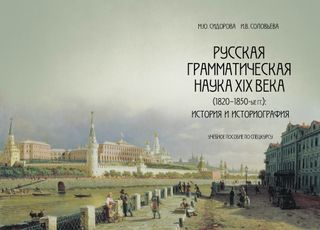?
Русская грамматическая наука XIX века (1820–1850-е гг.): история и историография
The textbook aims to describe the way the system of linguistic education was formed in the Russian grammar studies of the 1820-1850s. Their authors' approaches to theoretical and practical issues of learning Russian are extended with the analysis of their contemporaries' reviews of the grammar textbooks. Tables, diagrams, follow-up questions, literature lists as well as tasks for the analysis of scientific and linguistic texts will allow readers to process the information in a more productive way. The addenda provide the basic information about the biography and studies of the prominent modern linguists and philosophers as well as Russian philologists of the XVIII-XX centuries mentioned in the book.
The textbook is intended to be used in the course on the history of Russian linguistics or alike.
